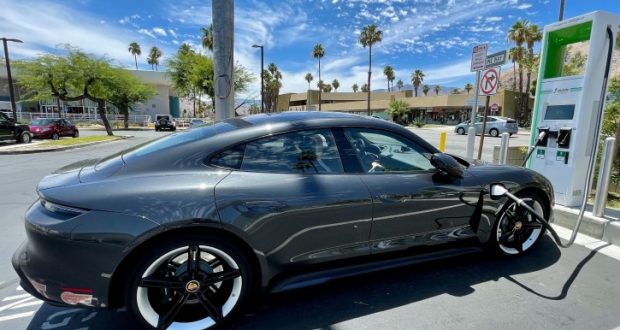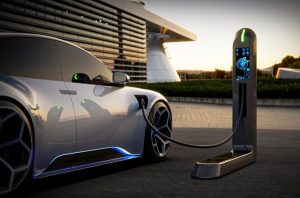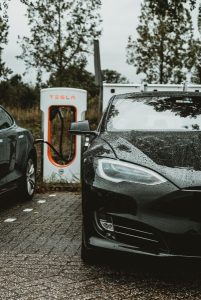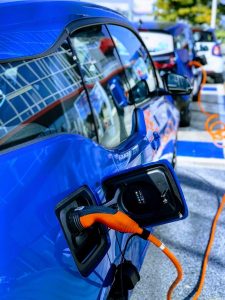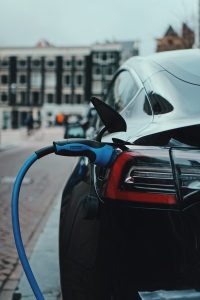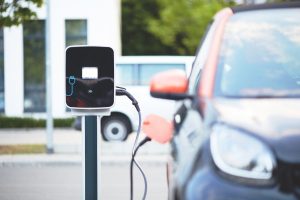OAKLAND — Pacific Gas and Electric Company (PG&E) today announced the launch of its Pre-Owned Electric Vehicle (EV) Rebate Program, providing qualified residential customers up to $4,000 when purchasing or leasing a pre-owned EV. The program aims to distribute more than $78 million to promote the adoption of EVs and make EV ownership more affordable for all customers.
 Current PG&E electric customers may qualify to receive a $1,000 or $4,000 rebate, based on household income, when purchasing or leasing an eligible pre-owned all-electric vehicle or plug-in hybrid EV. To take advantage of the offer, interested customers must successfully submit a rebate application within 180 days of the date of purchase or lease.
Current PG&E electric customers may qualify to receive a $1,000 or $4,000 rebate, based on household income, when purchasing or leasing an eligible pre-owned all-electric vehicle or plug-in hybrid EV. To take advantage of the offer, interested customers must successfully submit a rebate application within 180 days of the date of purchase or lease.
“This new rebate program addresses the continued growth of the pre-owned EV market with a focus on making EVs more affordable for all customers throughout our service area. Affordability can be a barrier to EV adoption, and this program will help offset costs for our customers who want to explore pre-owned EV ownership,” said Aaron August, PG&E Vice President, Utility Partnerships and Innovation.
The Pre-Owned EV Rebate Program is funded by the California Air Resources Board’s Low Carbon Fuel Standard (LCFS), an initiative designed to reduce the state’s greenhouse gas emissions that cause climate change. PG&E earns LCFS credits for supplying low-carbon fuel in the form of electricity, and re-distributes funds generated from the sale of those credits through customer programs. The Pre-Owned EV Rebate Program has no impact on customer rates.
 The rebate program is being implemented in partnership with the Center for Sustainable Energy.
The rebate program is being implemented in partnership with the Center for Sustainable Energy.
Additional EV Customer Programs and Incentives
PG&E offers a variety of tools, rebates and resources to help educate customers and encourage EV adoption. Customers are invited to check out PG&E’s EV Savings Calculator, an online resource to browse vehicles, discover incentives, locate charging stations and more. PG&E also offers an EV Rate Comparison tool to help customers find the best rate plan for them.
PG&E is preparing to launch additional EV programs in the coming months. Here are the programs currently available:
- PG&E’s EV Fleet Program helps customers with medium- and heavy-duty vehicles in their fleets to install cost-effective charging infrastructure to save money, reduce tailpipe emissions and simplify maintenance.
- Through its EV Fast Charge Program, PG&E is funding and installing infrastructure at qualifying customer sites to support the expansion of publicly available fast-charging stations for light-duty vehicles.
- PG&E’s EV Charge Schools Program is installing level 2 charging stations at school facilities and educational institutions for staff, parents and students to charge their EVs. PG&E helps fund the costs of purchasing and installing the EV charging equipment and networking fees at participating schools, as well as ongoing maintenance and operations. With at least 40% of the new chargers located in disadvantaged communities, the pilot is bringing EV charging options to customers who might not have had them before.
“The launch of the Pre-Owned EV Rebate Program directly aligns with our core focus of proactively preparing the grid for electric transportation, increasing access to EV infrastructure, and supporting EV adoption through rates, rebates, tools and education,” said August.
Nearly 500,000 EVs have been sold in PG&E’s service area, representing one in seven EVs in the country. As part of the 2030 targets outlined in PG&E’s Climate Strategy Report released last year, the company is preparing the grid to quickly and safely power at least 3 million EVs—or about 12,000 GWh of EV-related electric load. PG&E is also working to enable 2 million of those EVs to participate in vehicle-grid integration applications, allowing EVs to be a cornerstone of both electric reliability and climate resilience for PG&E customers broadly.
About Electric Cars and Vehicles
Electric cars, also known as electric vehicles (EVs), are a type of vehicle that runs on electricity instead of gasoline or diesel fuel. They have been around for over a century, but it was not until recently that they have gained popularity due to advancements in technology and increased concern for the environment.
One of the biggest benefits of electric cars is their environmental impact. Unlike traditional cars, electric cars do not emit harmful pollutants into the atmosphere, such as carbon monoxide and nitrogen oxides. This reduces air pollution and helps to mitigate the effects of climate change. Additionally, electric cars can be powered by clean energy sources, such as wind and solar, further reducing their impact on the environment.
Another advantage of electric cars is their lower operating costs. Although the upfront cost of purchasing an electric car may be higher than that of a traditional car, the cost of charging an electric car is significantly lower than the cost of fueling a traditional car. This is because electricity is cheaper than gasoline or diesel fuel, and electric cars are also more energy efficient, meaning they require less energy to travel the same distance as a traditional car.
Furthermore, electric cars offer a quiet and smooth driving experience. They have instant torque, meaning that they can accelerate quickly and smoothly, making them more enjoyable to drive. Additionally, electric cars produce less noise than traditional cars, creating a more peaceful and enjoyable driving experience.
Despite the many benefits of electric cars, there are also some challenges that need to be addressed. One of the biggest challenges is the limited range of electric cars, which can be a concern for drivers who need to travel long distances. However, this is rapidly improving, as the battery technology continues to evolve and the distance that electric cars can travel on a single charge continues to increase.
Another challenge is the lack of charging infrastructure in some areas, which can make it difficult for drivers to find a place to charge their electric car when they are on the road. However, governments and private companies are investing in the development of charging networks, which will help to address this issue.
In conclusion, electric cars are an increasingly popular alternative to traditional cars. They offer many benefits, including a reduced environmental impact, lower operating costs, a quiet and smooth driving experience, and they are powered by clean energy. Although there are still some challenges to overcome, such as the limited range and lack of charging infrastructure, the trend towards electric cars is clear and they are likely to become an even more important part of our transportation system in the future.
About PG&E
Pacific Gas and Electric Company, a subsidiary of PG&E Corporation (NYSE:PCG), is a combined natural gas and electric utility serving more than 16 million people across 70,000 square miles in Northern and Central California. For more information, visit www.pge.com and http://www.pge.com/about/newsroom.
Check out this short video on the long history of electric cars!

